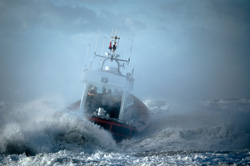Staying ahead of the waves
Ships out at sea can often run into emergency situations such as rough seas, but new safety systems can help avoid mishaps. The EU-funded project 'Advanced decision support system for ship design, operation and training' (ADOPT) aimed to minimise accidents through a new real-time, risk-based decision support system (DSS). The novel system integrated and functioned in three modes – design or office mode, training mode and operation mode. In other words, it was developed to assist ships during the design phase, train staff to respond more appropriately and ensure optimal decisions are taken during operation in high-risk situations. To achieve this, the system interfaced with several different data sources, hardware and software platforms. Essentially the system exploited high-tech information input to produce valid warnings that assist the crew in responding. It calculated parameters such as wave height, ship speed, encounter angle, rolling motion and others to produce recommendations based on high-tech responses. The different components of the project included numerical simulation, ship data gathering, man-machine interface, component integration and validation of the system. The ultimate goal was to provide expert decision-support capabilities that offer the crew crucial information that it normally wouldn't have access to. The emerging prototype system goes far beyond a pure software-hardware package for onboard use to a procedural process for the three modes of use (design, training and operation). ADOPT's feasibility was successfully demonstrated by testing its prototype in a simulated environment, although more improvements are needed with respect to response time before onboard integration can happen. Upcoming computer advances and ongoing research are expected to bring the concept closer to fruition, signifying a completely different and more efficient way of dealing with maritime hazards. Such promising technology is important not only for securing vessels and economic goods in transport, but also for saving lives.







